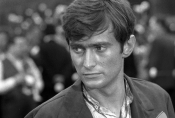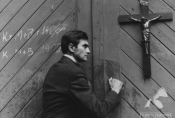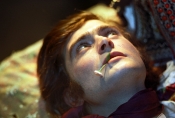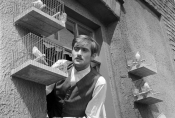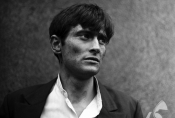Olgierd Łukaszewicz
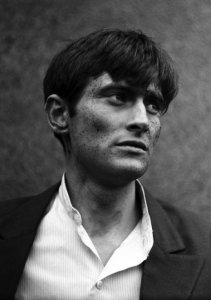
“To be an artist is a kind of vocation. Just as there is the ethos of the intelligentsia carrying on the torch of education, so there is the ethos of an artist, who shares his experiences with the audience, who shares the mystery of existence, love, and curiosity about another man. One is an artist on occasion, when one manages to touch the most important problems, a philosophical shortcut, some word penetrating to the bone,” the actor said in an interview for “Gazeta Lubuska” (1999).
He was born on September 7, 1946 in Chorzów. He is a graduate of the Acting Department of the State Higher School of Theatre in Krakow (1968). After graduation, he joined the Rozmaitości Theatre in Krakow (1968-1970), and then Warsaw theatres: Dramatyczny (1970-1973), Współczesny (1973-1974, 2001-2003), Powszechny (1974-1986), Studio (1986- 1997), Narodowy (1997-2001), and Polski (from 2003). Winner of many prestigious awards, such as the Zbigniew Cybulski Award (1971), as well as “Splendor Splendorów” for his radio work (2011).
He starred in over a hundred films and television series. He first appeared on screen (in one of the main roles at that) in 1968, as a sensitive boy Dancing w kwaterze Hitlera [Dancing in Hitler's headquarters] by Jan Batory. It was a good debut, but his truly great performances came later, in Sól ziemi czarnej/The Salt of the Black Earth (1969) and its sequel Perła w koronie/ Pearl In The Crown (1971). The former is a poetic, lyrical ballad, a Silesian tale about the seven Basista brothers, insurgents of 1920, directed by Kazimierz Kutz. Łukaszewicz played Gabriel, the youngest brother, who falls in love with the beautiful German nurse. The second film is devoted to the history of the mining strike in the 1930s, and a subtle love story – Łukaszewicz played Hansel – the honorable husband, father, miner, and citizen.
He was often cast in the roles of people who cared deeply for their homeland: in Romantyczni [The romantic ones] (1971) by Stanisław Różewicz, he played the insurgent Władysław Zaborowski, trying to get to Hungary to join General Bem’s army. In Zasieki [The fence] (1973) by Andrzej Jerzy Piotrowski – he was a soldier fighting at Lenino; in Gorączka/Fever (1980) by Agnieszka Holland – he was the leader of a group of fighters organising the assassination of the governor. In Wierna rzeka/Faithful River (1983) by Tadeusz Chmielewski, a successful adaptation of Stefan Żeromski's novel – a wounded insurgent Prince Józef Odrowąż, and finally in General Nil (2009) by Ryszard Bugajski, an attempt to reconstruct the last years of the legendary commander of the Home Army – he played the title character, Brigadier General August Emil “Nil” Fieldorf. The latter performance earned him the best actor award at the festival in Tiburon (2010).
One of the best roles in Łukaszewicz’s oeuvre is without doubt Stanisław, the younger brother of Bolesław, played by Daniel Olbrychski, in Wajda’s adaptation of Iwaszkiewicz’s Brzezina/Birchwood (1970), a beautiful film ballad about love, life, and death. Later, he worked with the director on two more occasions: Wesele/Wedding (1972), where he appeared as the spectre, and in Katyn (2007), where he played the chaplain.
Łukaszewicz gave a number of interesting performances in costume films, often (but not always) adaptations of famous books, for example: Zygmunt Szczerbic, one of the lovers Eve, the heroine of Dzieje grzechu/The Story of Sin (1975) by Borowczyk, a spectacular adaptation of the scandalous book by Stefan Żeromski; Lieutenant Alfred Kiekeritz in Lekcja martwego języka/Lesson of the Dead Language (1979) by Janusz Majewski, loosely based on the famous novel by Andrzej Kuśniewicz; Franzel, the eldest son of Hans Heinrich in Magnate (1986) by Filip Bajon, the dramatic story of the Silesian aristocratic von Teuss family set against the background of major political events of the late 19th and early 20th century, or the eighteenth-century “messiah” Jakub Frank in the mature debut of Adrian Panek Daas (2011).
Łukaszewicz is a versatile artist, capable of embodying historical characters as well as contemporary ones, and even people from the future, such as Albert in Seksmisja/Sexmission (1983) by Juliusz Machulski, one of the most popular films in the history of Polish cinema.
Selected filmography
-
1969
THE SALT OF THE BLACK EARTH
reż. Kazimierz Kutz
-
1970
THE BIRCH WOOD
reż. Andrzej Wajda
-
1971
THE PEARL IN THE CROWN
reż. Kazimierz Kutz
-
1980
FEVER
reż. Agnieszka Holland
-
1982
INTERROGATION
reż. Ryszard Bugajski
-
1983
FAITHFUL RIVER
reż. Tadeusz Chmielewski
-
1983
SEXMISSION
reż. Juliusz Machulski
-
1993
JOHNNIE THE WATERMAN
reż. Jan Jakub Kolski

